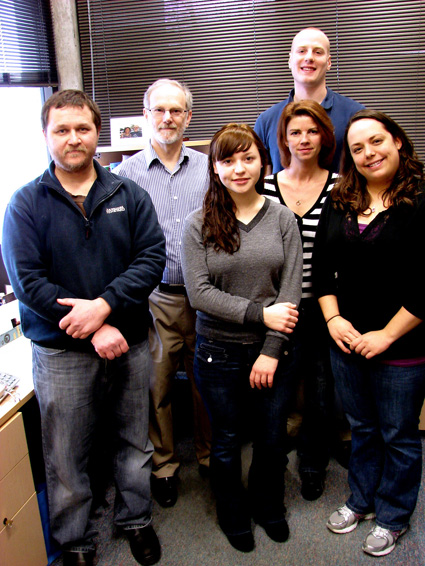Werren Lab

©2011 · University of Rochester , Department of Biology, Rochester, NY 14627 updated Nov 04, 2011
585-275-3889
Hutchison Hall 309
Department of Biology
University of Rochester
River Campus Box 270211
Rochester, New York 14627-0211
Left to right, front to back:
Dave Wheeler, Yelena Kernogitski, Amanda Avery
John (Jack) Werren, Rachel Edwards
Matthias Williams
Our area of interest is evolutionary genetics. We combine genetic, molecular, and population approaches to investigate basic questions in biology. Current research topics include investigating (1) genetic bases of developmental and behavioral differences between species, (2) genomics and co-evolution of insects and their symbiotic microorganisms (e.g. Wolbachia) (3) lateral gene transfers from bacteria to animals as a source of genetic innovation, and (4) genetics and genomics of parasitoid wasps, including function and evolution of parasitoid venoms. We use the emerging genetic model Nasonia (and relatives) to investigate these questions. The endosymbiotic bacterium Wolbachia, which is widespread in insects, is the primary focus of our bacterial work. Additional information on these topics is available below and via the relevant webpage links.
NEWS:
Jack Werren Selected as Nathaniel & Helen Wisch Professor of Biology: Nathaniel and Helen Wisch have made a generous donation to the University of Rochester to establish an endowed Professorship in Biology. Jack is proud to be the first recipient of this chair. The UR announcement about the position can be seen here.
SCIENCE PAPER: Using positional cloning, Loehlin & Werren (2012) have cloned the gene responsible for large differences in male wing size between Nasonia species, and shown it to be a well-known growth regulator called “unpaired” (upd). Further dissecting the region around this gene by fine-scale recombination has revealed regulatory modules affecting spatial and temporal expression of the gene. The upd gene is functionally related to interleukins in humans, which regulate cell growth and differentiation, and are involved in cancer. Loehlin & Werren propose that upd could be a “hotspot” for the evolution of growth regulation in diverse organisms, a proposition that needs to be further investigated.
Dave completed his PhD in autumn 2011 and is now a postdoctoral researcher in the laboratory of Sean Carroll. See a podcast interview by Jack Werren, Univeristy of Rochester press release, and NSF press release. The paper was selected as the Science Editor's Choice.
EUREKA!!: The Werren Lab has been awarded a EUREKA grant from NIH to explore the function and evolution of parasitoid venoms!! Eureka is a prestigious NIH grant to fund "exceptionally innovative research", and we are exceptionally excited about the prospects of exploring the function, evolution, and drug discovery potential of parasitoid venoms. If you are interested in learning more about this research area, contact Jack Werren.
Opportunities for graduate study in the Werren laboratory: Topics include (a) evolution of gene networks in development, (b) genetics of adaptation (behavior, morphology) and speciation (hybrid incompatibilities), (c) function and evolution of parasitoid venoms, (d) endosymbiosis and the dyanamics and evolution of microbial-host interactions (e.g. Wolbachia and other endosymbionts), (e) Lateral gene transfers between bacteria and animals, and (f) genome evolution, including the evolution of selfish DNA. For more information, contact Jack Werren.









